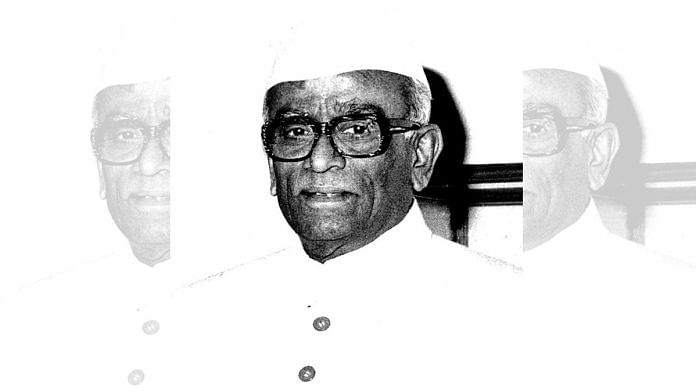New Delhi: Many remember Neelam Sanjiva Reddy as the sixth President of India, who was elected unopposed and saw unprecedented political turmoil with the swearing-in of three governments led by the Janata Party’s Morarji Desai, Charan Singh and Congress’ Indira Gandhi during his term.
He was also the first chief minister of Andhra Pradesh, credited with the architecture and modernisation of the state. “If Andhra Pradesh is hailed as the granary of South India, much credit is due to Dr. Sanjeeva Reddy,” former president Pranab Mukherjee in his address at the valedictory ceremony of Reddy’s birth centenary celebrations at his birthplace Ananthapuram, said in 2013.
However, his role as the first ever Lok Sabha Speaker to formally resign from his political party — the Congress — after assuming office, is often left unaddressed and under-appreciated, but it is one that speaks volumes about his impartiality and pragmatism.
On his death anniversary, here is a look back at the life and work of Neelam Sanjiva Reddy.
Also read: ‘Born comrade’ with feudal roots, Veerendra Kumar had one last wish — united socialist party
The President who renounced the perks
Born on 19 May 1913 in Illur village of Ananthapuram district in Andhra Pradesh, Reddy saw his life take a turn when Mahatma Gandhi visited the area in July 1929. Like many from his generation, he was also inspired by Gandhi’s thoughts, words and actions. Following his footsteps, he gave up Western products and began wearing only khadi clothes as he joined India’s freedom struggle.
At the age of 64, Reddy went on to become the first President of India to be elected unopposed in 1977, and the youngest to occupy Rashtrapati Bhavan, only to renounce the residency soon after and take a 70 per cent cut in his salary to support the poor in 1977.
As the chief minister of Andhra Pradesh (1956–60, 1962–64), he had moved towards a system of decentralised power and strengthening of democracy at the grassroots with his “creative leadership and progressive outlook, coupled with his pragmatic approach”.
In the book ‘India: Past and Present’, Prakash Chander writes, “To Reddy, power was never an end in itself but only a means to an end, that being the welfare of the people.”
Also read: Pramod Mahajan, BJP’s master strategist and troubleshooter before Amit Shah
The Lok Sabha Speaker who quit Congress
In an article titled “Speakers must rise above party loyalties, with the Constitution as their guiding light” in The Indian Express, Chakshu Roy writes, “With no security in the continuity of office, the Speaker is dependent on his or her political party for reelection. This makes the Speaker susceptible to pulls and pressures from her/his political party in the conduct of the proceedings of the Lok Sabha.”
While this may be the case in 21st century India, it was not so when Reddy took oath. The role of a Speaker is symbolic of “dignity and power of the House over which she is presiding”, said Pandit Jawaharlal Nehru, India’s first Prime Minister. “He/she represents the dignity of the House, the freedom of the House and because the House represents the nation, in a particular way, the Speaker becomes a symbol of nation’s freedom and liberty.”
Once the Speaker is elected, he/she is escorted to the chair with both members of the ruling and opposition party — a show that the Speaker belongs to the House. Reddy stood tall as the very symbol Nehru had once claimed a Speaker to be.
While his resignation from Congress upon taking office was a first, that was not all. His decision to allow a no confidence motion on the same day as the President’s address in both Houses, reflected his core belief in the importance of urgent matters and when traditions and precedents can and must be set aside.
His determination to ensure equal opportunities to both sides resulted in another first in the history of the House — a person was imprisoned for shouting slogans and throwing pamphlets on the floor of the House from the Visitors’ Gallery. He was booked for “committing contempt of the House”.
Reddy as a Speaker did not just appear to be “fair and impartial”, he practised it too. “He conducted the proceedings of the House with such dexterity that there was not even a single occasion when the Opposition resorted to staging a walkout from the House,” writes Chander.




HIS ROLE AS PRESIDENT WAS NOT ALL THAT GLORIOUS HE DENIED JAGJIVAN RAM A CHANCE TO BECOME PRIME MINISTER IN 1979 AND DISSOLVED PARLIAMENT. HAD JAGJIVAN RAM BECOME PM THE HISTORY OF INDIA WOULD HAVE BEEN DIFFERENT A GENUINE TWO PARTY SYESTEM WOULD HAVE EVOLVED.
Huh, the author should know better. Go to Anantapur and enquire around, especially the people of his generation.